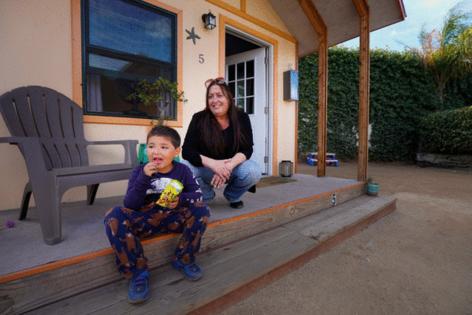El Cajon, California, allows successful cabin program for homeless to continue
Published in News & Features
SAN DIEGO — A program to provide homeless women and children temporary shelter in small cabins at an El Cajon church has resulted in most clients finding permanent housing over the past two years and has the city’s blessing to continue indefinitely.
The nonprofit Amikas, which oversees the emergency sleeping cabins, for years had promoted the small structures as a dignified, comfortable and safe way to provide shelter for homeless people. El Cajon became the first city in the county to agree to allow them on a temporary basis at Meridian Baptist Church in 2020, but only on a temporary basis.
It would be two years before the opening of the seven-cabin village, including one unit as a shared kitchen and office, with the first client moving in on Dec. 31, 2022.
The church allows only women and children in the program, and the city’s conditions included ending the pilot program on Dec. 31, 2024.
With little fanfare or discussion, the El Cajon City Council agreed to strike the words “pilot program” and all references to the sunset date at their Dec. 10 meeting, allowing the program to continue indefinitely under an administrative zoning permit.
The Rev. Rolland Slade, senior pastor at the church and an Amikas board member, said he attended the meeting and was prepared to speak, but found he didn’t have to.
“I guess it was their way of saying, ‘We approve of this, it hasn’t been a problem for us, let’s keep doing it,” he said.
Slade said he would like to see the program expand to 10 cabins and is hopeful that other cities will be willing to create their own villages after seeing the success in El Cajon. So far, however, there have been no takers, despite what he said is proof that such a program can exist problem-free.
“We have not had any calls to El Cajon PD,” he said. “We haven’t had any eviction problems.”
The cabins are 12-feet by 12-feet with a porch and have electricity, but no plumbing. The little village is not visible from the street, and on a recent afternoon the only noise came from a couple of young girls giggling and riding their bicycles over the dirt lot.
The village has been a temporary home for 45 people, including 27 women and their children or grandchildren since opening. Of those, 21 women moved into housing, or 78%. In comparison, about 17% of people in shelters overseen by the San Diego Housing Commission exited into permanent housing during the current fiscal year, according to the commission’s data.
The 11 people now at the Meridian Church village include Carol Ortiz and her grandson, Zayden, who have been in their cabin since Sept. 26.
While their stay has exceeded the official 90-day limit, Slade said there are exceptions for people who are actively working to find housing.
Ortiz, 55, is working two part-time jobs in security and said she may have a third lined up, also part time. Taking home about $1,200 a month, she said she needs to find a full-time job to afford rent.
Before moving to San Diego to be with her son, daughter and grandson in February, Ortiz had worked as a credit manager at a New York radio station for 11 years and also worked in human resources for IBM for 13 years.
With everyone living in one small apartment after arriving in San Diego, she said tensions at home led her to move out.
She found places to stay temporarily, but eventually spent one night sleeping on an El Cajon bench before someone connected her with the Amikas program.
“This is the first time I find myself in a position like this, and I was scared to death,” she said, adding that she was afraid to go into a shelter.
“You know what?” she said. “This place is awesome. Not only did they give me a place to stay here, they give me food and shelter over my head, and he and I are safe. But they also help me get medical.
“I also get counseling on the phone twice a month, because I needed it,” she continued. “I didn’t think I did, but I did. I just couldn’t stop crying the first two months. The thought of everything was just so scary. Because what do you do?”
At least one El Cajon City Council member is open to the idea of expanding the Amikas program.
The program was brought to the El Cajon City Council in 2020 by Councilmember Steve Goble, who in November brought a request to the council to use some federal American Rescue Plan Act funds for additional cabins at the church. City Manager Graham Mitchell, however, said the funds could not be used for the program because they are not allowed to expand the footprint for the sleeping cabins at this time.
©2025 The San Diego Union-Tribune. Visit sandiegouniontribune.com. Distributed by Tribune Content Agency, LLC.







Comments